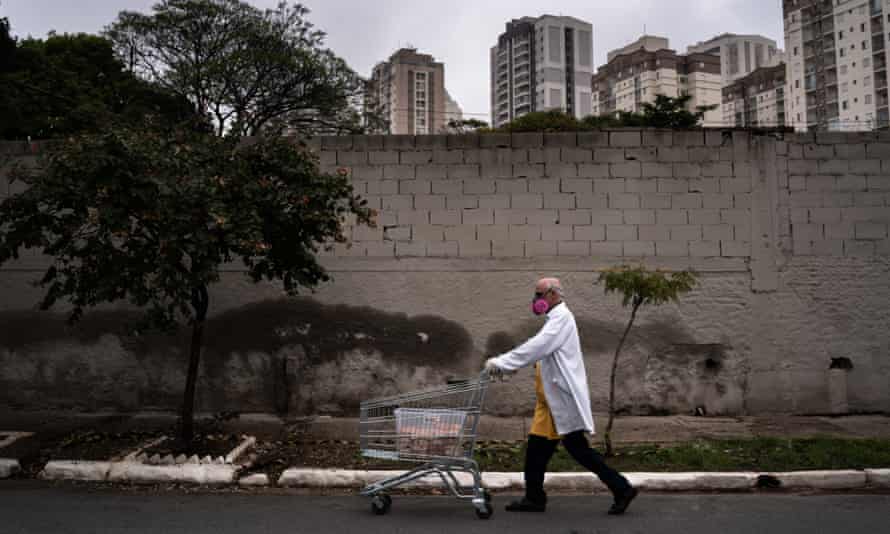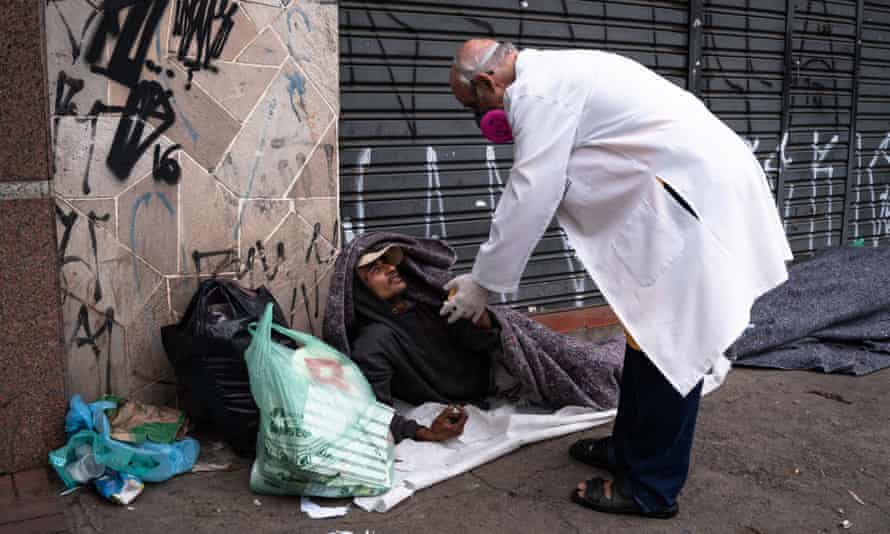IIn 2017, most Brazilians were still unfamiliar with the name Jair Bolsonaro. But for Júlio Lancellotti, there was already cause for concern in the reactionary rhetoric of the man who would be elected president two years later under the slogan: “Brazil above all, God above all.”
“It amazes me that a homophobic person like Bolsonaro appears on the presidential ballot,” said the priest during Mass on March 7 of that year in the San Miguel Arcángel parish in the East Zone of São Paulo. The sermon, in which he also preached against the culture of rape and sexism, was typical of the man who has dedicated his life to fighting injustice, and as a result often finds himself in the crosshairs of conservative politicians.
An openly leftist priest embracing revolutionary ideas: the 72-year-old has proven to be on arm with anti-system protesters from the “black bloc” And he believes hotels should provide free rooms for the homeless: Lancellotti apparently represents the antithesis of everything the president of Brazil stands for. He was even sued by Bolsonaro for non-pecuniary damage due to his mass in March 2017 (a judge dismissed the complaint).

But Lancelloti’s confrontation with authorities began long before Bolsonaro took office. As a novice in the late 1960s, he was expelled from the seminary for “misconduct,” as he describes it.
He says that the seminary where he first studied, in the city of Araraquara, was “very conservative.” His days were marked by censorship and abusive punishments. “They beat me with a bamboo stick, they forced me to kneel on corn kernels… one day, a priest said that I was asking too much in class, that I was very critical. They fired me “.
After this episode, Lancellotti spent years away from the priesthood. He graduated from a course in education in 1978, began working with juvenile offenders, and soon became a thorn in the side of the authorities.
“I refused to accept the torture I witnessed against the youth. I felt that all the time those who were aligned with the government were testing me, ”he says. It was during these years that Lancellotti met progressive priests who were actively committed to the cause of the rights of the child and, in doing so, rediscovered the sense that social justice was possible within the Roman Catholic Church. He resumed his theological studies and, in 1985, he became a priest.
Since 1996, Lancelotti coordinates the pastoral commission for the homeless in São Paulo, which helps some 35,000 people in the district. Describe being peppered, spit out and pounded in the stomach by the São Paulo municipal guard while helping the homeless in 2018.
Lancelotti says the Covid pandemic has worsened living conditions for the homeless in São Paulo, while the ultraconservatism of the Bolsonaro era has fueled what the priest describes as “aporophobia”: fear and rejection of the poor. .
In August, the deputy of the state of São Paulo Janaina paschoal praised the military police after they blocked the commission’s homeless access to an area of downtown dubbed Cracoland – “Crackland”.
Advocating for the homeless is the focus of Lancellotti’s activism, but not his only cause. He does not hesitate to position himself in favor of controversial groups such as those involved in black bloc tactics in the demonstrations. “The best guys I have ever met. The purest, the truest. They have been unjustly tortured and criminalized, ”says Lancellotti, who helped secure the release of some of the protesters from prison in 2013.

Consequently, criticism against him comes from all sides. But of all Lancellotti’s critics, Christians are by far the fiercest, says the priest. “Atheists tend to be more human than those who claim to be Christians. Those who say ‘God above all’ are the same ones who put humans under all ”.
He remains a popular figure for many. His phone rings all day and he’s busy with calls, whether it’s a media request or talking to a fellow activist.
An avid social media user, the images you post while helping the homeless can bring happy results. “Families from all over Brazil have been able to find relatives who were believed to have disappeared,” he says.
It has even inspired a federal bill. Passed by the Senate on March 31 last year, the “Júlio Lancellotti bill” aims to prohibit the practice of placing stones and iron spikes in underpasses, a measure adopted by mayors to prevent people without home sleep there. Now back in the lower house and waiting to be reviewed, the bill is a reminder of the day. Lancellotti carried a mallet to the stones that had been placed in an underpass in São Paulo.
Lancellotti’s current approach is to pressure the city council to carry out a more responsible census. According to the priest, the last one in 2019 did not accurately record the number of homeless people in São Paulo, leading to policies that are unable to solve the problem.
Envisioning a better future for Brazil is still difficult for Lancellotti. “Anyone who takes office after this monster [Bolsonaro] he will not be able to restore everything that he destroyed in culture, health and education, even in 10 years “, he says, adding:” The Bolsonarism He didn’t show up overnight and he won’t be hit overnight. “
In a country torn by violence and hatred, he concludes, the only way forward is through “dialogue and love.”
Sign up for a different view with our Global Dispatch newsletter – a roundup of our top stories from around the world, recommended reading and thoughts from our team on key development and human rights issues – delivered to your inbox every two weeks. :
Sign up for Global Dispatch – check your spam folder for confirmation email
www.theguardian.com
George is Digismak’s reported cum editor with 13 years of experience in Journalism